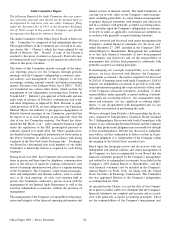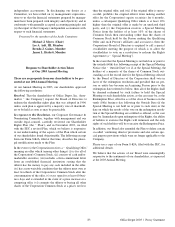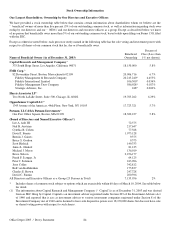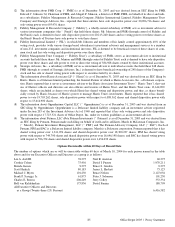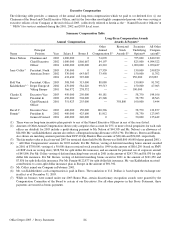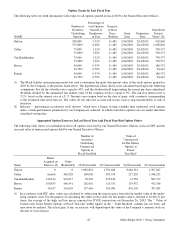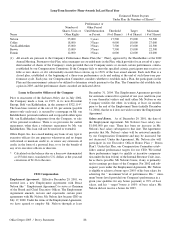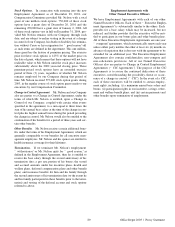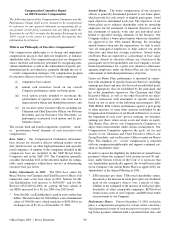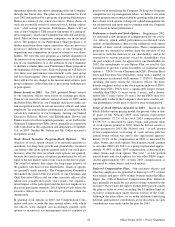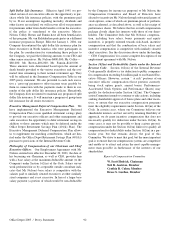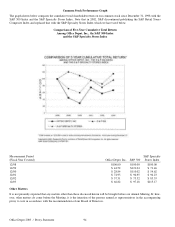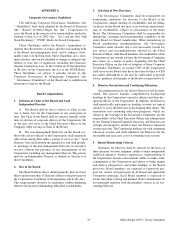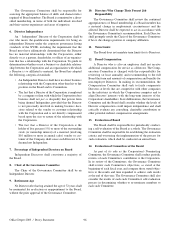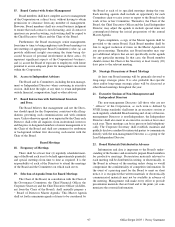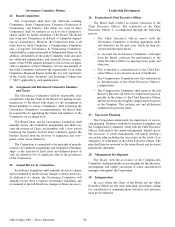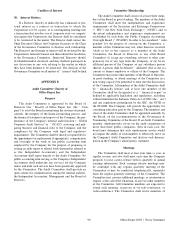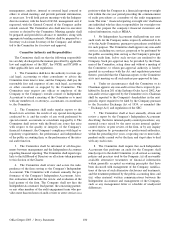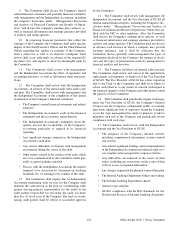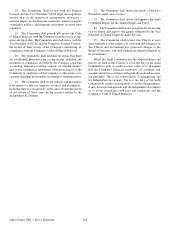Office Depot 2003 Annual Report Download - page 94
Download and view the complete annual report
Please find page 94 of the 2003 Office Depot annual report below. You can navigate through the pages in the report by either clicking on the pages listed below, or by using the keyword search tool below to find specific information within the annual report.Office Depot 2003 / Proxy Statement 92
Split Dollar Life Insurance. Effective April 1995, we pro-
vided certain of our executive officers the opportunity to pur-
chase whole life insurance policies, with the premiums paid
by us. If our assumptions regarding mortality, dividends and
other factors are realized, we will recover all of our payments
for premiums either from death benefits or from the executive,
if the policy is transferred to the executive. Messrs.
Nelson, Colley, Brown and Fannin have all been beneficiaries
of this program. Mr. van Kaldekerken participates in a different
insurance program in Europe. Effective January 1, 2004, our
Company discontinued the split dollar life insurance plan for
those executives in North America who were participants in
the plan. In consideration for surrendering these policies to
the Company, we paid the following amounts to our CEO and
other senior executives: Mr. Nelson—$480,000; Mr. Colley—
$80,000; Mr. Brown—$96,000; Mr. Fannin—$140,000.
These amounts were determined based upon the amount of
death benefit provided to the various executives and the esti-
mated time remaining to their normal retirement age. They
will be reflected in the Summary Compensation Table in our
2005 proxy statement. We also provided to each such execu-
tive a ‘gross-up’ payment to offset income taxes payable by
them in connection with the payments made to them in sur-
render of the split dollar life insurance policies. Henceforth,
the Company does not intend to maintain any program of split
dollar life insurance. It will maintain a program of group term
life insurance for all senior executives.
Executive Management Deferred Compensation Plan. We
have implemented the Executive Management Deferred
Compensation Plan (a non qualified retirement savings plan)
to provide our executive officers and other management and
sales executives the opportunity to defer retirement savings in
addition to those amounts which may be deferred under the
Office Depot Retirement Savings Plan (401(k) Plan). The
Executive Management Deferred Compensation Plan allows
us to supplement our matching contributions, which are lim-
ited under the Office Depot Retirement Savings Plan (401(k))
pursuant to provisions of the Internal Revenue Code.
Philosophy of Compensation of our Chairman and Chief
Executive Officer. Our Employment Agreement with Mr.
Nelson, entered into effective December 29, 2001, the date of
his becoming our Chairman, as well as CEO, provides him
with a base salary at the maximum deductible amount (to the
Company) under Section 162(m) of the Code. Salary survey
work performed for us by a reputable outside consultant indi-
cates that Mr. Nelson’s base salary is competitive with the
salaries paid to similarly situated executives at other similarly
sized companies and is not excessive. In lieu of a larger base
salary payment (a portion of which would be non-deductible
by the Company for income tax purposes) to Mr. Nelson, the
Compensation Committee and Board of Directors have
elected to incentivize Mr. Nelson through substantial grants of
stock options, some of which are premium-priced or perform-
ance-accelerated, as described above, as well as his receipt of
performance shares. We believe that his overall compensation
package closely aligns his interests with those of our share-
holders. The Committee feels that Mr. Nelson’s compensa-
tion, including base salary, bonus payments and equity
incentives, is properly oriented towards risk-based, incentive
compensation and that the combination of base salary and
incentive compensation is competitive with similarly situated
chief executives. See the discussion above under the heading
“ CEO Compensation”for a more complete description of our
employment agreement with Mr. Nelson.
Section 162(m) and Deductibility Limits under the Internal
Revenue Code. Section 162(m) of the Internal Revenue
Code generally disallows a tax deduction to public companies
for compensation exceeding $1 million paid to our Named Exe-
cutiveOfficers. However, certain “ at risk” portions of our
executive officers’ compensation (those portions currently
being stock option grants, annual bonus, Performance-
Accelerated Stock Options and Performance Shares) may
qualify for deduction under Section 162(m). The Compen-
sation Committee intends to continue to take actions, including
seeking shareholder approval of bonus plans and other incen-
tives, to ensure that our executive compensation programs
meet the eligibility requirements under Section 162(m) of the
Code. In certain cases, where our Committee believes our
shareholder interests are best served by retaining flexibility of
approach, we do grant incentive compensation that does not
necessarily qualify for deduction under Section 162(m). In
some cases, it may not be possible to keep a given person’s
compensation under the Section 162(m) limit or to qualify all
compensation for deductibility under Section 162(m) in a par-
ticular year, but that remains always the goal of this
Committee. We strive to meet that goal, but the more important
goal is to ensure that our compensation systems are competitive
and enable us to attract and retain the most capable manage-
ment team possible in furtherance of the interests of our
shareholders.
Report of Compensation Committee
W. Scott Hedrick, Chairman
Neil R. Austrian, Member
Cynthia R. Cohen, Member
Bruce S. Gordon, Member


